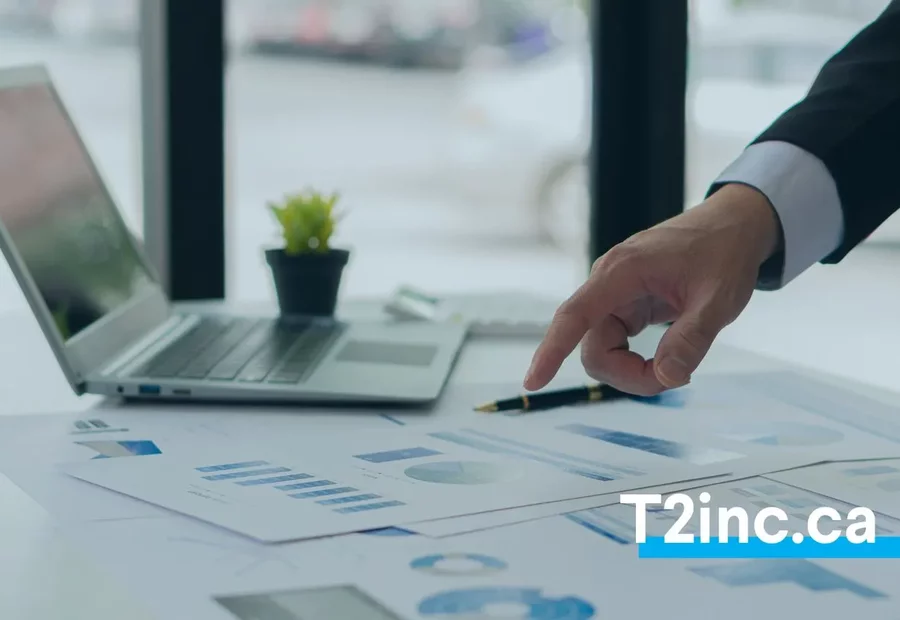Guide to Starting a Sole Proprietorship in Quebec

Starting your own sole proprietorship in Quebec is an exciting and challenging adventure. Whether you have an innovative business idea, a special talent to offer or want to be your own boss, starting a sole proprietorship is the first step towards achieving your professional and financial goals.
However, the process can still be somewhat daunting, especially if you don't know where to start. In this article, our team of small business tax accountants presents a comprehensive guide to help you better understand the structure of a sole proprietorship and how to start one!
What is a sole proprietorship?
Let’s start with the basics: a clear legal definition of sole proprietorship in Quebec. A sole proprietorship, also known as a personal business, is a business run by one person in which there is no legal distinction between the business and its owner. Keep reading to learn what this means.
Legal definition of a sole proprietorship
Under Quebec law, a sole proprietorship is a business operated by an individual. Unlike partnerships or corporations, a sole proprietorship is not treated as a separate legal entity from its owner. This means that the business and the owner are considered as one legal unit.
Distinctive features of a sole proprietorship in Quebec
A sole proprietorship has specific characteristics that distinguish it from other business structures.
Individual ownership
A sole proprietorship is owned and operated by one person, called the "sole proprietor" or "owner". This person has complete control over the decisions and operations of the business.
Unlimited personal liability
As a sole proprietor, you are personally liable for all your business debts and obligations. Your liability is not limited to the assets of the business, which means that your personal assets can be used to satisfy creditors in the event of a bankruptcy or tax dispute.
Simpler administration
One of the attractive features of a sole proprietorship is its administrative simplicity: there is no need to draw up articles of association or formal contracts. Compared to other forms of business, a sole proprietorship is generally simpler and more affordable to create.
Simpler taxation
For tax purposes, a sole proprietorship is considered an extension of the individual who owns it. Income from the sole proprietorship is generally taxed in the owner's name, and business profits and losses are included on the owner's personal income tax return.
Advantages and disadvantages of a sole proprietorship
When considering whether to create a sole proprietorship in Quebec, it is important to understand the pros and cons of this legal structure. Here is a detailed analysis of the main points to consider.
Flexibility and simplicity
One of the main advantages of a sole proprietorship is that it is a simple business structure, which allows for some flexibility. As a sole proprietor, you have complete control over all decisions regarding your business. You can make decisions quickly, adapt your business to market changes and implement strategies without having to consult other stakeholders.
In addition, setting up a sole proprietorship is relatively simple and inexpensive. You won’t need to draw up formal articles of association or contracts. This makes for a simpler administrative process and costs less if you eventually choose to incorporate.
Unlimited personal liability
One of the major disadvantages of a sole proprietorship is having unlimited personal liability. As the owner, you are personally responsible for all your business debts and obligations. Your personal assets, including your estate, can be used to satisfy creditors in the event of bankruptcy or litigation.
The risks associated with unlimited personal liability must be understood and carefully managed. The best way to protect your personal assets and minimize your risks is to obtain liability insurance.
Taxation and legal implications
From a tax perspective, sole proprietorship has distinct advantages. Income from a sole proprietorship is usually taxed in the owner's name, and business profits and losses are included on the owner's personal income tax return.
This tax structure can provide some flexibility in terms of tax deductions and loss carryovers. However, it is important to understand the specific tax rules applicable to sole proprietorships and to keep accurate records of your business income and expenses.
From a legal standpoint, a sole proprietorship does not have a separate legal identity from its owner, meaning that you are solely responsible for complying with the laws and regulations applicable to your line of business, and you will be personally liable if you do not do so correctly.
Starting a sole proprietorship in Quebec
Creating a sole proprietorship in Quebec involves several key steps. Here’s what you need to do.
1. Preliminary planning
- Identify your business sector and target clientele: Decide what type of business you want to run and identify your target market. Do a market analysis to understand the demand for your product or service and develop an appropriate strategy.
- Evaluate the viability of the project: Conduct a feasibility study to evaluate the economic viability of your business idea. Analyze costs, potential revenues, competition and market trends to determine whether your venture will be viable in the long term.
2. Choose a name and register your company
- Choose an appropriate name and reserve it: Confirm that the name you want to use for your business is available and appropriate and reserve it with the Registraire des entreprises du Québec.
- Register your business: To register a sole proprietorship, you will need to submit the necessary forms online or in person at the Registraire des entreprises du Québec. Required documents will include information about your business, your name, your address and other relevant details.
3. Obtain any necessary permits and licenses
- Activity-specific permits: Depending on the industry in which you operate, you may need relevant permits. For example, food businesses, medical professionals and construction contractors often require special permits to function. Check with the appropriate government agencies for details.
- Licenses regulated by government agencies: Some business sectors are regulated by government agencies. If your sole proprietorship operates in one of these sectors, you are legally obliged to obtain the necessary professional and business licenses, environmental permits, etc.
4. Tax and regulatory obligations
- Business Number (BN): Once your sole proprietorship is registered, you will receive a Business Number (BN), which is essential for all communication with tax and administrative authorities.
- Registration with Revenu Québec and the Canada Revenue Agency (CRA): You must register with Revenu Québec and the Canada Revenue Agency (CRA) to obtain tax numbers that will allow you to file your corporate taxes.
- Sales Tax Responsibilities (GST/QST): If your sole proprietorship is subject to sales taxes, such as the Goods and Services Tax (GST) and the Quebec Sales Tax (QST), you will need to register for sales tax programs and collect these taxes on your products or services.
Creating a sole proprietorship in Quebec could allow you to get started as an entrepreneur and develop professionally. If you have any questions or need assistance in setting up your sole proprietorship, contact T2inc.ca. Our team of Montreal tax accountants can guide you through the process and help you successfully start your sole proprietorship.
Online tools and resources for starting a sole proprietorship in Quebec
Thanks to technology, you can create and register a sole proprietorship online. Keep reading to learn about the tools and resources that make this process easier.
Online platforms for business registration:
There are several official online platforms that you can use to register a sole proprietorship in Quebec.
Registraire des entreprises du Québec (REQ)
The REQ is the official Quebec government website for business registration. Navigate a user-friendly interface and fill out the necessary forms to create a sole proprietorship. Here you can access information on naming rules, reserve a business name and submit your registration application online.
Entreprises Québec
The Entreprises Québec portal brings together various services and information for entrepreneurs, all in the French language. Visit the section for creating a sole proprietorship in Quebec, where you can make the most of numerous planning tools and step-by-step guides to help you through the process.
Online information and support
If you have any questions or need information on how to start a business, check out the following resources.
Government sites
Government sites provide official information and forms that you will need to start a sole proprietorship in Quebec. Revenu Québec and the Canada Revenue Agency (CRA) have sections specific to sole proprietorships, where you can find information on tax obligations, identification numbers, sales taxes and much more.
Online services to help you start your own business
Other online services provide resources and personalized guidance for starting a sole proprietorship, including how-to guides, planning tools, sample documents and expert advice. They can also help you navigate the administrative and tax aspects of starting your own business.
Tips for launching a sole proprietorship in Quebec
Now that you are familiar with the basics, let’s delve deeper into how you can make your start-up a success by following some practical business advice.
Develop a solid business plan
- Market research and competitive analysis: Before you launch a sole proprietorship in Quebec, conduct a thorough market study. This will help you understand your industry, identify your competitors, analyze market demand and determine your brand positioning. Use demographic data and market reports and do online research to gather valuable information.
- Goal setting and growth strategies: Set clear and realistic goals for your individual business. What do you want to accomplish in the short term and long term? Identify the strategies and concrete actions you will take to achieve these goals. This may include developing new products or services, expanding geographically, diversifying your customer base, etc.
Financial management and accounting
- Basic bookkeeping and accounting: Financial and accounting management is crucial to the success of your sole proprietorship. Be sure to keep accurate and up-to-date accounting records. This includes managing invoices, receipts, bank statements and expenses. If you are not familiar with accounting principles, consider hiring a CPA to help you.
- Budget and Cash Flow Management: Develop a realistic business budget and monitor it closely. Identify your sources of income and expenses, and make sure you maintain a healthy financial balance. Manage your cash flow proactively to avoid cash flow problems. Anticipate troughs and ensure you have adequate financial reserves.
Why seek the help of a tax specialist to set up a sole proprietorship?
For all of the above reasons, it may be worthwhile to rely on a corporate tax specialist who can help you benefit from all relevant tax credits.
Remember that the more income your business generates, the more taxes you will have to pay. A tax professional can help you revisit and rethink the legal structure of your business to make sure it is the best choice for your circumstances. They can even help you incorporate your business if it’s time to take the next step.
Marketing and promotion
- Creating an online presence: In today's business landscape, an online presence is essential. Create a professional website that showcases your products or services and makes it easy for people to contact you. Also, consider investing in relevant social media so that you can use online platforms to interact with your clients, share relevant content and present promotions.
- Effective marketing strategies: Identify the best marketing strategies to promote your individual business. This may include online advertising, local SEO, partnering with other complementary businesses, attending trade shows or distributing flyers in your community. Choose tactics that fit your target audience and budget.
Improve your corporate taxation and accounting with T2inc.ca
In Quebec, a sole proprietorship is officially linked with one person: the owner. This business structure can offer both freedom and flexibility.
Hiring a business tax and accounting service can help with the financial management of a sole proprietorship. If your sole proprietorship grows quickly, it could rapidly become a burden.
Are you ready to incorporate your sole proprietorship and benefit from shared corporate management? The tax accountants at T2inc can help you every step of the way.
Contact us to learn more about our services!
- What is a sole proprietorship?
- Advantages and disadvantages of a sole proprietorship
- Starting a sole proprietorship in Quebec
- Online tools and resources for starting a sole proprietorship in Quebec
- Tips for launching a sole proprietorship in Quebec
- Improve your corporate taxation and accounting with T2inc.ca
Contact our experts
Have a question? Need help? Fill out our online form to get help from our experts.
Contact usNeed more help?
Contact us by filling out our form
Are you interested in our services, but would like more information before taking the plunge? Contact us today and one of our tax accountants will be in touch to help you.
At T2inc.ca, we're committed to helping business owners manage their company's tax affairs so they can grow their business.




